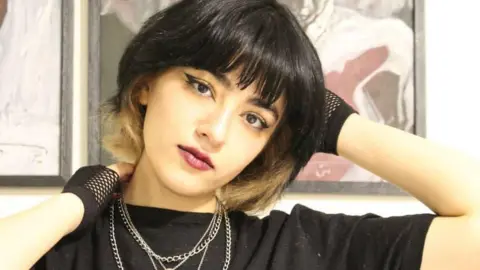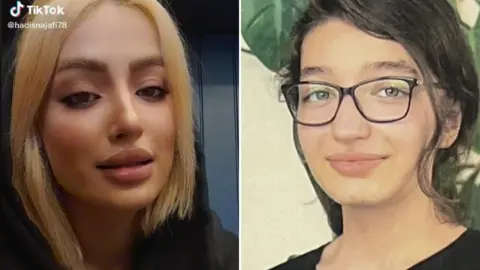Nika Shakarami: Iran protester's family forced to lie about death - source
 BBC Persian source
BBC Persian sourceRelatives of a girl who died during protests in Iran have been forced into making false statements, a source close to the family has told BBC Persian.
Nika Shakarami, 16, went missing in Tehran on 20 September after telling a friend she was being chased by police.
On Wednesday night, a state TV report showed her aunt, Atash, saying: "Nika was killed falling from a building."
Her uncle was also seen on TV speaking against the unrest, as someone seems to whisper to him: "Say it, you scumbag!"
The source told BBC Persian that these were both "forced confessions" that came "after intense interrogations and being threatened that other family members would be killed".
Atash and Nika's uncle, Mohsen, were detained by authorities after Atash posted messages online about her niece's death and spoke to the media. The televised statements were recorded before they were released, according to the source.
Allow X content?

Atash told BBC Persian prior to her arrest on Sunday that the Revolutionary Guards had told her that Nika was in their custody for five days and then handed over to prison authorities.
The judiciary has said that on the night she disappeared Nika went into a building where eight construction workers were present, and that she was found dead in the yard outside the next morning.
Tehran judiciary official Mohammad Shahriari was cited by state media as saying on Wednesday that a post-mortem showed Nika suffered "multiple fractures... in the pelvis, head, upper and lower limbs, arms and legs, which indicate that the person was thrown from a height".
He declared that this proved her death was nothing to do with the protests.
However, a death certificate issued by a cemetery in the capital, which was obtained by BBC Persian, states that she died after suffering "multiple injuries caused by blows with a hard object".
Nika's Instagram and Telegram accounts were also deleted after she went missing, according to Atash. Iranian security forces are known to demand that detainees give them access to the social media accounts so that the accounts or certain posts can be deleted.
Wednesday night's state TV report also featured footage in which Atash was seen confirming that her niece's body was found outside the building mentioned by the judiciary, even though that contradicted previous statements made by her and other members of the family.
The family have said they located Nika's body at the mortuary of a detention centre 10 days after she went missing, and that they were only allowed by officials to see her face for a few seconds in order to identify her. Atash said before she was detained that she did not go to the mortuary.
Nika's family transferred her body to her father's hometown of Khorramabad, in the west of the country, on Sunday - on what would have been her 17th birthday.
A source close to them told BBC Persian that the family agreed, under duress from authorities, not to hold a public funeral. But, the source said, security forces then "stole" Nika's body from Khorramabad and secretly buried it in the village of Veysian, about 40km (25 miles) away.
Hundreds of protesters later gathered in Khorramabad's cemetery and chanted slogans against the government, including "death to the dictator" - a reference to Supreme Leader Ayatollah Khamenei.
 TikTok/Facebook
TikTok/FacebookNika is not the only young female protester to have been killed during the unrest that erupted last month following the death of Mahsa Amini, a 22-year-old woman who was detained by the morality police for allegedly violating the Islamic Republic's strict hijab law.
The family of Hadis Najafi, 22, have said that she was shot dead by security forces while protesting in the city of Karaj, west of Tehran, on 21 September. Officials allegedly asked her father to say that she died of a heart attack.
Another 16-year-old girl, Sarina Esmailzadeh, died after being severely beaten on the head with batons by security forces during protests in Karaj on 23 September, Amnesty International cited a source as saying. The source also told the human rights group that security and intelligence agents had harassed the girl's family to coerce them into silence.
Several videos made by Sarina before her death have now been posted on social media. In one recorded after finishing some school exams, she says: "Nothing feels better than freedom."
